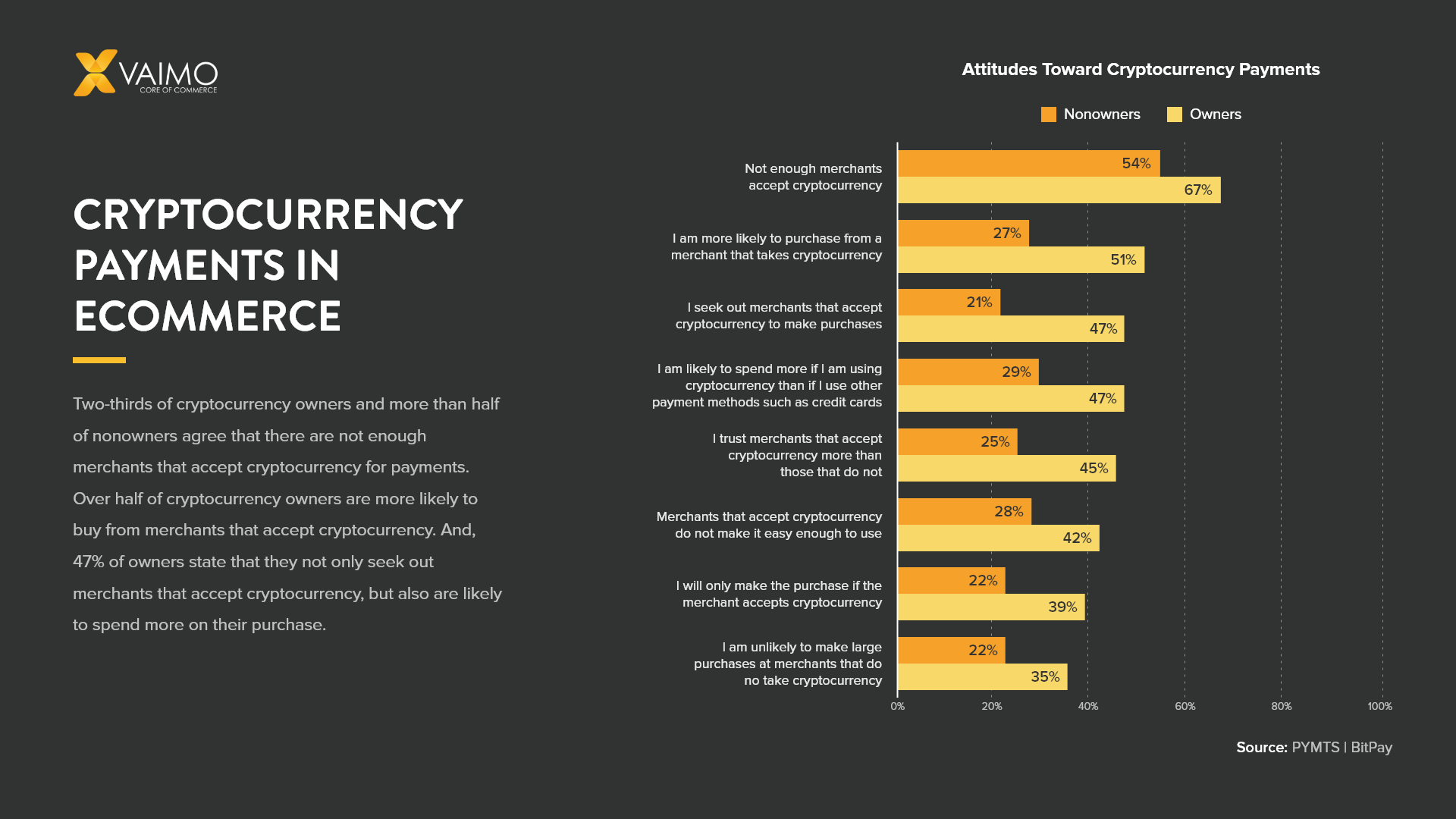The world of ecommerce is changing. Cryptocurrency, most often Bitcoin, is a digital currency for which encryption techniques are leveraged to regulate its use and generate its release. It is decentralized, meaning it isn’t made or controlled by any one individual, company, or country; instead, it relies on complex mathematical algorithms that govern the amount of Bitcoins generated and how they can be used. This guarantees limited inflation and ensures transactions can occur without using third parties like credit card companies, banks, or other financial institutions. Bitcoin payments are immediate and don’t incur international transaction fees, so merchants get more money in their pockets.
Large companies like AT&T, Microsoft, a few airlines, and the Miami Dolphins were early adopters of crypto acceptance. And based on their larger-tickets items and technical wherewithal, it makes sense for them to explore crypto. But for small to medium businesses with smaller ticket items, accepting crypto can seem like an enormous undertaking. In 2019, companies like Starbucks, Nordstrom, and Home Depot began accepting digital currencies through crypto-wallets. And while recent additions like Yum Brands who operate Pizza Hut and Taco Bell are both dabbling in crypto, the number of early adopters in the smaller-purchase retail sector is still very limited.
But as the popularity of online shopping and the expectation and demand for a seamless digital customer experience continues to rise, it is arguable that the benefits of accepting cryptocurrency will outweigh the effort of incorporating it into your ecommerce strategy. As of August 2021, there are over 70MM blockchain wallet holders, comprising more than 6000 varieties of cryptocurrency. Between 2018 and 2020, the number of bitcoin holders grew by nearly 200% and continues to grow.
With this growth not slowing, it’s becoming imperative for ecommerce businesses to find a way to tie crypto into their customer experience. This article will outline some of the benefits of offering crypto payments as an option, both for B2C and B2B merchants and companies.
Benefits of Cryptocurrency Payments in Ecommerce
Increased Speed
People want everything quickly. I’m not going to blame Amazon Prime, but I’m pretty sure they had something to do with this. We want fast transactions, from the “buy now” button to tapping the side button on our phones. We want to make our purchase fast, and we want the items delivered quickly. Crypto removes a layer of processing time that affects both. With immediate, accurate data about both the customer and the supply chain and transparency into your inventory, this exchange can occur seamlessly.
Improved Security
Cryptocurrencies are based on blockchain technology, touted as one of the safest technologies today. On top of being desirable for consumer protection, blockchain allows companies to avoid other security risks by handling some of the transactional duties that other less-secure systems are usually required to do. And for merchants with high-risk products containing proof of validity or expiration date, blockchain can immediately confirm the validity or authenticity of the products, allowing consumers a strong sense of trust.
Increased Loyalty and Trust
The definition of loyalty in ecommerce has changed. Today, it has a much deeper meaning and impact, and expectations from the consumers keep growing. Maintaining customer loyalty requires an innovative ecommerce experience that varies wildly from one consumer set to another. Having comprehensive, robust data instantly about your buyers can allow you the flexibility to serve loyalty in a way that impacts your audiences, including the ability to pay in a method that they feel safe about. Personalization plays a significant role in loyalty today, just as it does in search and suggestions with today’s consumer.
Related reading: Ecommerce Personalization – Benefits, Tactics, and Best Practices
Reduced Costs
If you’ve ever used a credit card or PayPal merchant account to process transactions on your website, then you’re most likely familiar with the fees that come along with it. For example, both credit cards and PayPal charge around 3% per transaction. The costs associated with processing credit card fees can be prohibitive, especially to businesses with expensive products or tight margins.
Setting up the process for accepting cryptocurrency does involve some up-front costs. But once everything is in place, the costs of managing crypto payments are much lower than the costs associated with credit card payments. Crypto can also reduce or even eliminate the need to accept foreign currencies or have a multi-currency option on your ecommerce site, which means lower transaction costs and reduced security risks for international transfers.
|
Want more advice on this topic? |
Instant Access to Funds
The general trust in financial institutions and their corporate values are in decline, leading to many consumers gravitating toward cryptocurrencies. And the same concerns that make the public reluctant to put all their eggs in one basket most certainly apply to businesses as well. When you offer crypto payment methods, you have instantaneous access to the funds being transferred. The elegance of the transaction and its efficiencies benefit both the merchant and the customer, allowing for a permanent record without relying on a middle man.
Streamlined Agreements
For B2B merchants, the ability to execute a contract electronically with complex artificial intelligence (AI) and finely tailored solutions is a stand-out feature. Negotiating and managing once-complicated contracts and agreements with a greater range of options for your customer will soon be a baseline expectation. With modern business buyers’ age decreasing every year, this expectation is only getting stronger. In tandem with efficient agreement processes, the ability to expand your marketplace reach and extend your customer profile arises. What was once a cumbersome B2B onboarding process can turn into a transaction simple enough for a B2C customer to complete.
Access to New Markets and Demographics
Did you know there are 2 billion people in the world with no access to traditional banking services? In the US, the unbanked represent almost 7% of the adult population. Cryptocurrencies eliminate the need for an intermediary between buyer and seller – meaning everyone with an internet connection is now financially accessible. But it isn’t just about democratizing currency – using Bitcoin allows businesses to tap into emerging markets and make their offer accessible to a broader audience. This means more customers, which means more opportunities to sell.
Related reading: NFT Art Sites – A New Revenue Channel for Ecommerce Merchants
Cryptocurrency is Changing the Ecommerce Landscape
The more options that you give customers, the broader your audience will be. Crypto-focused marketplaces like Open Bazaar allow B2B, B2C, and peer-to-peer ecommerce to take place between companies and people who have already elected to use crypto.
These marketplaces offer very low setup and operating costs along with lower competition from those marketplaces that sell anything and everything like Amazon. Even Facebook is rolling out its own cryptocurrency called Diem in 2021 to link the option of crypto payments to social selling for a seamless customer experience.
PayPal has already implemented a “Pay with Crypto” option that gives millions of US retailers the ability to accept crypto using their platform as a service. Whether you elect to use a service like these or Coinbase or use an extension on your own ecommerce platform, there are many possibilities to explore.
Key Takeaways
Today’s fast-paced digital age has ushered in a new era of ecommerce, but many are still unaware of cryptocurrencies and their benefits to online stores. Introducing crypto into the equation offers many advantages that traditional fiat currency does not. The benefits include:
- Increased Speed
- Improved Security
- Increased Loyalty and Trust
- Reduced Costs
- Instant Access to Funds
- Streamlined Agreements
- Access to New Markets and Demographics
How Vaimo Can Help
Vaimo can help you to decide which currencies and which customer experience journeys are suitable for your audiences. Our strategy team can help you implement the tools and guide you in selecting the right path for your ecommerce future.
Get in touch with our team of experts to learn how we can help you expand your ecommerce business.











